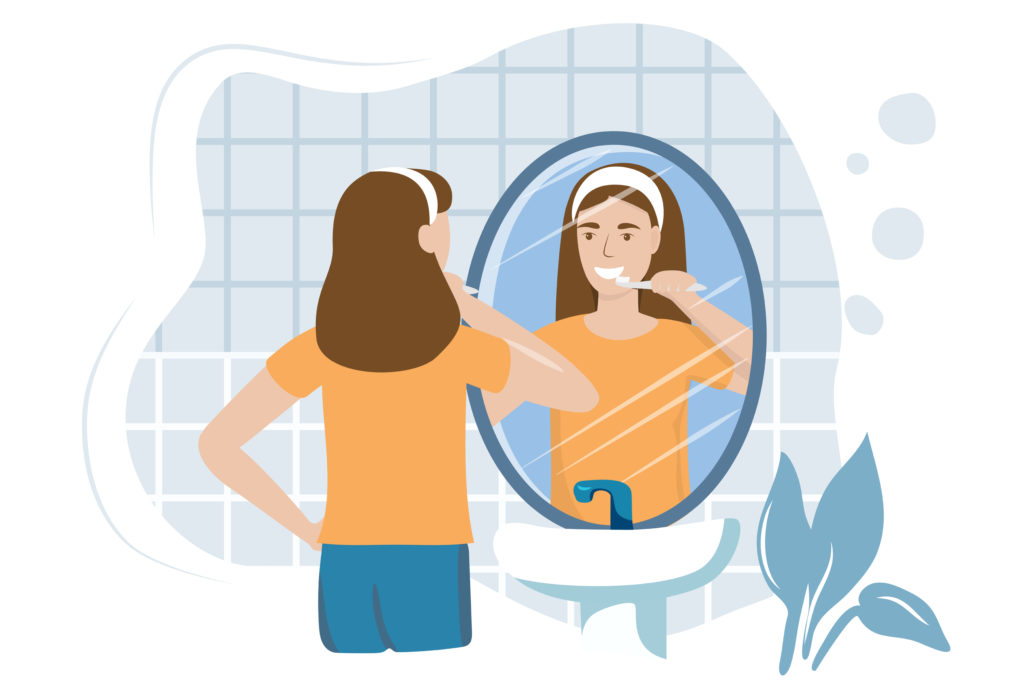
The basis of a good oral hygiene routine is the twice daily brushing with a toothbrush and toothpaste; it is the hope that absolutely everybody does this at the very least.
Dentists recommend twice daily as a bare minimum and encourage brushing after every meal if it is at all possible. It is also important that your brushing technique is accurate as incorrect brushing can be as damaging to your teeth and gums as it is beneficial. You should always brush your teeth in a circular motion.
Brushing backwards and forwards across the gum line can damage and break down gum tissue as well as being less effective at removing plaque. You should also ensure that every surface of every tooth is covered; there should not be a front, back or side missed out in your cleaning routine. Your dentist will be happy to demonstrate a good brushing technique if you are worried yours is wrong.
Remember though that brushing alone is only doing 60% of the job; that leaves 40% of your mouth unclean and flossing is the way to put that right.
Flossing should not be forgotten

If you do not already do so, it is the hope that after reading this information you will incorporate flossing into your daily oral health routine. Dentists recommend flossing twice a day, before or after you brush your teeth morning and evening. As a bare minimum you should floss once a day at night, before or after brushing. You should take as long as necessary to effectively clean between every pair of teeth, not forgetting the back of your last ones. It can be time consuming but you should persevere as it is doing a wonderful job of keeping your mouth healthy.
There is a basic argument for the necessity of flossing on a daily basis and this is down to the process of plaque formation. It takes around 24 hours for dental plaque to fully form but it only takes between 24 and 72 hours for plaque to transform into dental tartar which cannot be removed through any amount of brushing or flossing. If you floss daily then dental plaque is constantly being removed from between the teeth, allowing less opportunity for plaque to develop into tartar; which can only be removed with a professional cleaning.
The final thing to remember is the fact that inadequate or incorrect flossing techniques are about as useful as not flossing at all. If you do not floss regularly then doing so can cause the gums to become sore or even bleed. Similarly, if your flossing technique is wrong then you run the risk of causing damage to the gum tissue. Therefore, it is important that your flossing practice is regular, accurate and effective if you do not want to be wasting your time. A guide to the correct technique for flossing will follow in ‘How to use dental floss properly’ but if you still feel unsure as to whether your flossing technique is correct then your dentist would be happy to discuss this with you.
Not forgetting…
As well as effective brushing and flossing there are other things you could do to further improve your oral health routine. Mouthwash is an extremely effective way of keeping bacteria and food particles to a minimum in the mouth, as well as giving you a lasting fresh breath. You can also chew sugar free chewing gum after meals to generate saliva that will help clean away food particles. Drinking water is also effective in clearing bacteria from the mouth. Healthy food choices can also help; for example, raw or crunchy vegetables such as carrot or celery are particularly good at cleaning the teeth and massaging the gums. Eating these sorts of foods regularly will help keep plaque formation to a minimum during the day and will also do wonders for your overall health.
There are many ways to maintain a good and effective oral health routine but if your basic daily routine does not yet include flossing then you should really consider the benefits of incorporating this simple practice into your life; you are unlikely to regret it in twenty year’s time.

